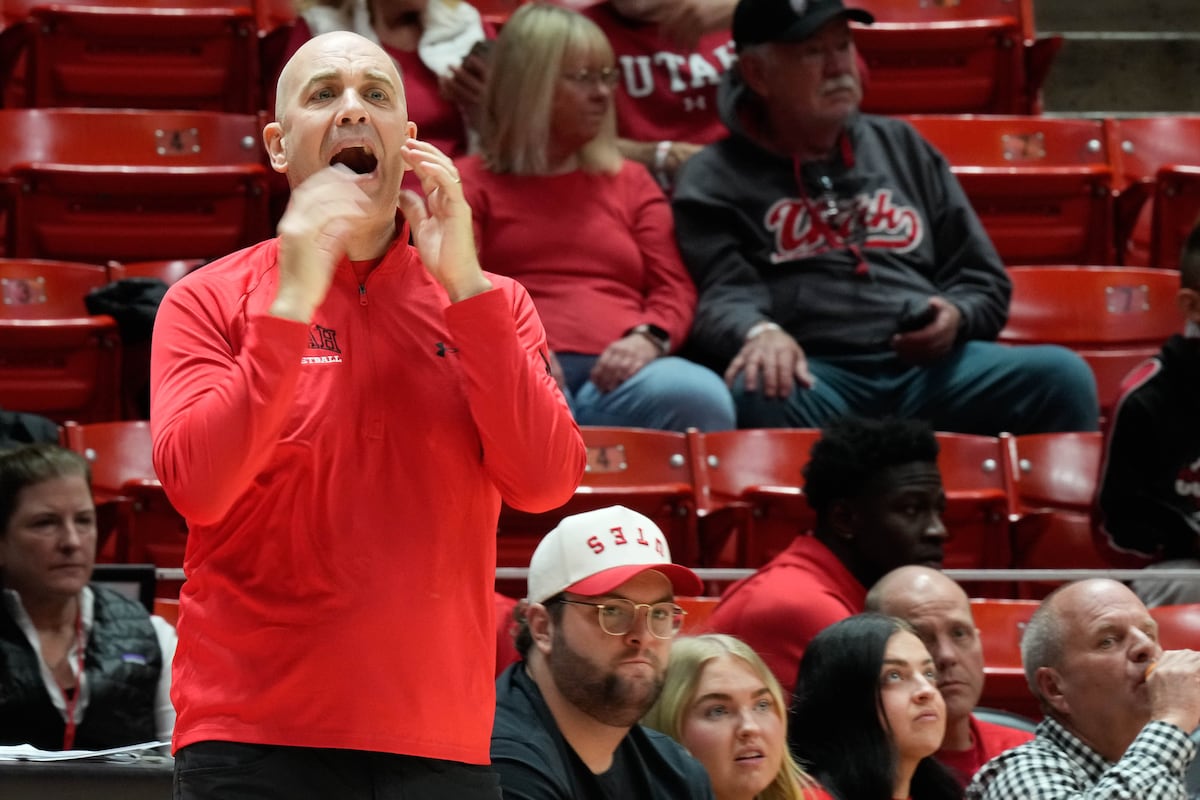Utah’s Big 12 slate is officially here.
And, with a grueling schedule on the horizon, Utah head coach Craig Smith was still looking for answers before Utah’s first conference contest against No. 25 Baylor on Tuesday.
A week earlier, Utah led Iowa by 11 at one point, but crumbled due to second-half defensive miscues in the paint, which allowed the Hawkeyes to win by seven points.
The same defensive issues, Smith said, were present in Utah’s losses to Saint Mary’s and Mississippi State earlier this season.
“Our second-half defense is what let us down,” Smith said, “especially like the last 10 minutes or so of the game. We have to get better. You’ve got to be able to be able to get stops when you need to get stops to win those types of games. We’re probably eight to 10 possessions away from being undefeated.
“We’re close, really close, but you have to be able to finish those games.”
Smith is determined to get the Utes back on track, despite being 0-3 against Quad 1 and Quad 2 non-conference opponents in the NCAA’s NET Rankings.
That just makes Utah’s path in the Big 12 that much more important if it wants to return to the NCAA Tournament for the first time since 2016.
Nine of the Big 12’s 16 teams currently rank inside the top 50 in the NET Rankings. Each of Utah’s next three conference opponents — Baylor, Texas Tech and Iowa State — are all inside of the top 25 of the rankings, meaning the Utes have a chance to make some early noise in their new conference.
(Francisco Kjolseth | The Salt Lake Tribune) The Utah men’s basketball team takes on Queens at the Huntsman Center on Tuesday, Nov. 12, 2024.
That starts with fixing their second-half defense.
“I always feel like everything’s fixable,” Smith said of the defensive issues. “You just have to identify what it is, right? And so at the end of the day, we just haven’t been able to get enough stops late in the game against all three of those teams.
“There’s a lot to look at. Are certain guys playing too many minutes? You know, is it a scheme? Do we have to mix things up more? The other thing is, just, we have to be better with concentration and focus then we have to carry it forward.”
So far, Smith has already tinkered with his lineups at the guard spot.
To start the season, junior guard Mike Sharavjamts started nine straight games before slowly being transitioned into a bench role. He has played an average of 10.7 minutes per game in Utah’s last four contests.
Mason Madsen, the brother of Gabe Madsen, started his first game as a Ute against Iowa, scoring a season-high 26 points on 10 of 20 shooting. A game before then, Hunter Erickson was slotted into the starting guard spot in Utah’s win against Florida A&M.
(Trent Nelson | The Salt Lake Tribune) Utah Utes guard Mason Madsen (45) as Utah hosts Eastern Washington, NCAA basketball in Salt Lake City on Saturday, Nov. 30, 2024.
“I wouldn’t say anybody solidified in this spot or that spot,” Smith said. “We can go a lot of different ways. And you know, it might be a thing that keeps revolving until somebody really owns up to it
“It could be a thing where certain guys have a great week of practice. It could be or they start really playing super sound. It could be a thing where matchups dictate it.”
The emergence of Caleb Lohner, who played with Utah’s football team as a tight end in the fall, has also affected the front-court rotation.
Rice sophomore transfer forward Keanu Dawes played at least 16 minutes in his first six appearances. In his last three appearances, he’s played less than 11 minutes in each contest and didn’t even see the floor against the Hawkeyes.
“He’s got a very bright future,” Smith said of Dawes. “But you have to demonstrate that on a consistent basis. Certainly (Keanu’s) right in the picture. He’s just gotta keep going and keep getting better and keep pushing forward.”
With Big 12 play set to tip off against the Bears on Tuesday at noon MT, Utah will have yet another chance to capture its first big win of the season.
In Smith’s eyes, a lot of that starts with consistency on the defensive end and finding the right rotations within the Runnin’ Utes’ lineups.
Once that starts happening, maybe Utah will finally be able to capture its first Quad 1 win of the 2024-25 season.
“We have to find a way to get stops,” Smith said. “That’s the bottom line. We have to be able to find a way to get stops and possessions on a consistent basis against good teams.”











